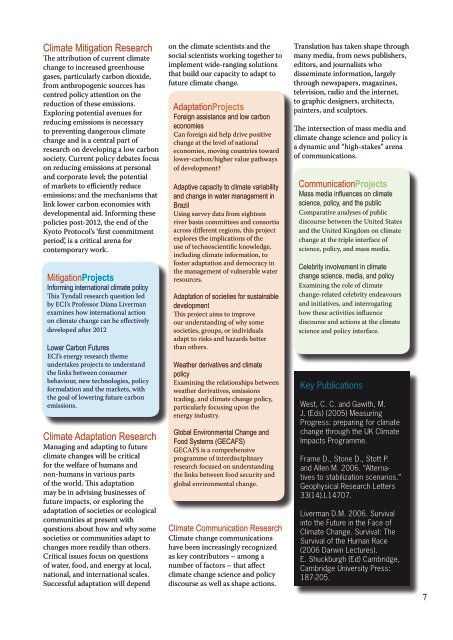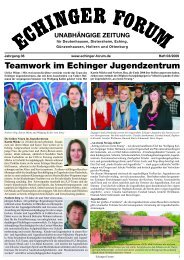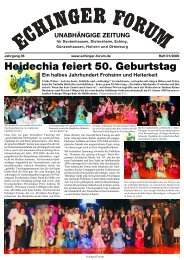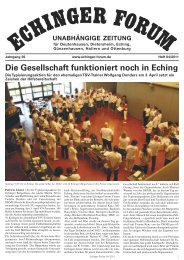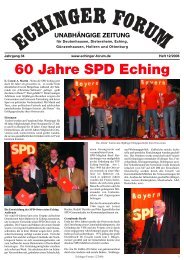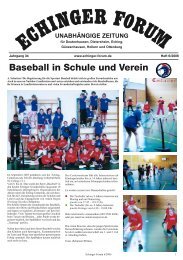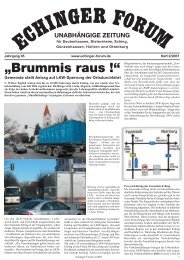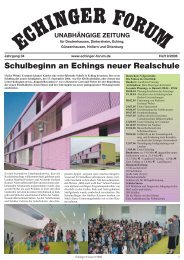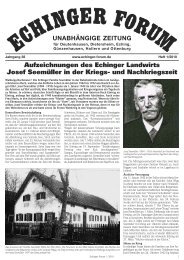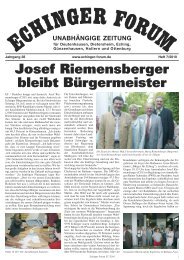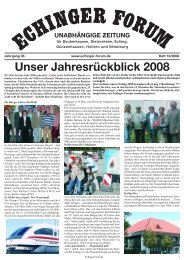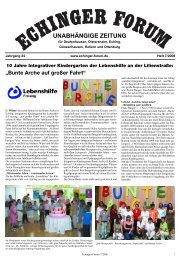Büro Karl Holmer Sachverständiger für Kraftfahrzeuge - Echinger Forum
Büro Karl Holmer Sachverständiger für Kraftfahrzeuge - Echinger Forum
Büro Karl Holmer Sachverständiger für Kraftfahrzeuge - Echinger Forum
Create successful ePaper yourself
Turn your PDF publications into a flip-book with our unique Google optimized e-Paper software.
Climate Mitigation Research<br />
The attribution of current climate<br />
change to increased greenhouse<br />
gases, particularly carbon dioxide,<br />
from anthropogenic sources has<br />
centred policy attention on the<br />
reduction of these emissions.<br />
Exploring potential avenues for<br />
reducing emissions is necessary<br />
to preventing dangerous climate<br />
change and is a central part of<br />
research on developing a low carbon<br />
society. Current policy debates focus<br />
on reducing emissions at personal<br />
and corporate level; the potential<br />
of markets to efficiently reduce<br />
emissions; and the mechanisms that<br />
link lower carbon economies with<br />
developmental aid. Informing these<br />
policies post-2012, the end of the<br />
Kyoto Protocol’s ‘first commitment<br />
period’, is a critical arena for<br />
contemporary work.<br />
MitigationProjects<br />
Informing international climate policy<br />
This Tyndall research question led<br />
by ECI’s Professor Diana Liverman<br />
examines how international action<br />
on climate change can be effectively<br />
developed after 2012<br />
Lower Carbon Futures<br />
ECI’s energy research theme<br />
undertakes projects to understand<br />
the links between consumer<br />
behaviour, new technologies, policy<br />
formulation and the markets, with<br />
the goal of lowering future carbon<br />
emissions.<br />
Climate Adaptation Research<br />
Managing and adapting to future<br />
climate changes will be critical<br />
for the welfare of humans and<br />
non-humans in various parts<br />
of the world. This adaptation<br />
may be in advising businesses of<br />
future impacts, or exploring the<br />
adaptation of societies or ecological<br />
communities at present with<br />
questions about how and why some<br />
societies or communities adapt to<br />
changes more readily than others.<br />
Critical issues focus on questions<br />
of water, food, and energy at local,<br />
national, and international scales.<br />
Successful adaptation will depend<br />
on the climate scientists and the<br />
social scientists working together to<br />
implement wide-ranging solutions<br />
that build our capacity to adapt to<br />
future climate change.<br />
AdaptationProjects<br />
Foreign assistance and low carbon<br />
economies<br />
Can foreign aid help drive positive<br />
change at the level of national<br />
economies, moving countries toward<br />
lower-carbon/higher value pathways<br />
of development?<br />
Adaptive capacity to climate variability<br />
and change in water management in<br />
Brazil<br />
Using survey data from eighteen<br />
river basin committees and consortia<br />
across different regions, this project<br />
explores the implications of the<br />
use of technoscientific knowledge,<br />
including climate information, to<br />
foster adaptation and democracy in<br />
the management of vulnerable water<br />
resources.<br />
Adaptation of societies for sustainable<br />
development<br />
This project aims to improve<br />
our understanding of why some<br />
societies, groups, or individuals<br />
adapt to risks and hazards better<br />
than others.<br />
Weather derivatives and climate<br />
policy<br />
Examining the relationships between<br />
weather derivatives, emissions<br />
trading, and climate change policy,<br />
particularly focusing upon the<br />
energy industry.<br />
Global Environmental Change and<br />
Food Systems (GECAFS)<br />
GECAFS is a comprehensive<br />
programme of interdisciplinary<br />
research focused on understanding<br />
the links between food security and<br />
global environmental change.<br />
Climate Communication Research<br />
Climate change communications<br />
have been increasingly recognized<br />
as key contributors – among a<br />
number of factors – that affect<br />
climate change science and policy<br />
discourse as well as shape actions.<br />
Translation has taken shape through<br />
many media, from news publishers,<br />
editors, and journalists who<br />
disseminate information, largely<br />
through newspapers, magazines,<br />
television, radio and the internet,<br />
to graphic designers, architects,<br />
painters, and sculptors.<br />
The intersection of mass media and<br />
climate change science and policy is<br />
a dynamic and “high-stakes” arena<br />
of communications.<br />
CommunicationProjects<br />
Mass media influences on climate<br />
science, policy, and the public<br />
Comparative analyses of public<br />
discourse between the United States<br />
and the United Kingdom on climate<br />
change at the triple interface of<br />
science, policy, and mass media.<br />
Celebrity involvement in climate<br />
change science, media, and policy<br />
Examining the role of climate<br />
change-related celebrity endeavours<br />
and initiatives, and interrogating<br />
how these activities influence<br />
discourse and actions at the climate<br />
science and policy interface.<br />
Key Publications<br />
West, C. C. and Gawith, M.<br />
J. (Eds) (2005) Measuring<br />
Progress: preparing for climate<br />
change through the UK Climate<br />
Impacts Programme.<br />
Frame D., Stone D., Stott P.<br />
and Allen M. 2006. “Alternatives<br />
to stabilization scenarios.”<br />
Geophysical Research Letters<br />
33(14).L14707.<br />
Liverman D.M. 2006. Survival<br />
into the Future in the Face of<br />
Climate Change. Survival: The<br />
Survival of the Human Race<br />
(2006 Darwin Lectures).<br />
E. Shuckburgh (Ed) Cambridge,<br />
Cambridge University Press:<br />
187-205.


